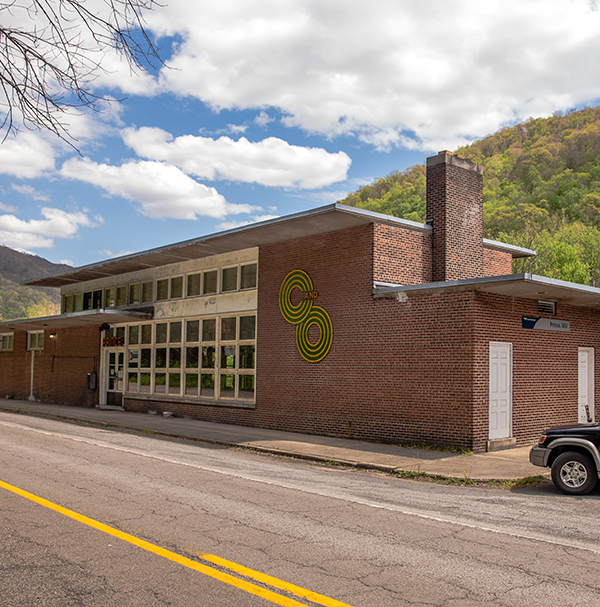Prince, WV (PRC)
Located along the shore of the New River, the Prince depot is an Art Moderne masterpiece built to signal a new era in passenger railroading.

5034 Stanaford Road
Prince, WV 25907
Annual Station Ridership (FY 2024): 1,958
- Facility Ownership: CSX Transportation
- Parking Lot Ownership: CSX Transportation
- Platform Ownership: CSX Transportation
- Track Ownership: CSX Transportation
Todd Stennis
Regional Contact
governmentaffairsnol@amtrak.com
For information about Amtrak fares and schedules, please visit Amtrak.com or call 1-800-USA-RAIL (1-800-872-7245).
The first station at Prince was built by the Chesapeake and Ohio Railway (C&O) in 1880. This wooden depot was enlarged in 1891 to serve an expanding commercial freight and passenger need. Nearly destroyed in a 1917 fire, it was rebuilt soon afterwards.
The current red brick station was erected as part of a 1942 vision by C&O president Robert R. Young, who wanted to create a stylish, streamlined and efficient passenger rail system for the post-World War II era. Designed by the railroad and the Cleveland-based architectural firm of Garfield, Harris, Robinson and Schaffer, the building opened on June 26, 1946 during a celebration attended by nearly 3,000 people. It was immediately noted for its sleek Art Moderne features, such as large expanses of glass on the north and south facades, flat cantilevered roof and terrazzo flooring.
Taking advantage of the site along the New River, the architects oriented the building so that during the winter, the sun warms those who wait along the platform and inside the depot, while during the summer, the roof and platform canopy provide shady relief from the heat. In the waiting room, visitors can still see the C&O’s original “Chessie” kitten logo embedded in the floor.
Chessie is considered one of the most popular corporate symbols in American history. L.C. Probert, a C&O official charged with public relations and advertising, saw an etching in a newspaper of a cuddly little kitten sleeping under a blanket with a paw thrust contentedly forward. At the time, he was developing an ad campaign to popularize C&O’s new air-conditioned sleeping car service, and hit upon the notion of using the kitten with the slogan “Sleep Like a Kitten and Wake Up Fresh as a Daisy in Air-Conditioned Comfort” for the C&O passenger ads.
Chessie’s first appearance on behalf of C&O was in the September 1933 issue of Fortune, in an ad that carried “Sleep Like a Kitten” as its slogan. So popular was the kitten logo that after Amtrak took over C&O’s passenger service in 1971, Chessie took on a new role, giving her name to the combined C&O, Baltimore & Ohio, and Western Maryland railways under the Chessie System name, and helped them sell their freight service. A later merger with the Family Lines railroads created CSX and led to Chessie’s retirement.
In addition to the waiting area and ticket desk, the 125 foot long by 22 foot wide depot contained restrooms, a ladies’ lounge and freight, baggage and express rooms; passengers noted modern technologies such as ultraviolet lights and radiant heating in the floor. On one end of the waiting room, there is a wall-length photo mural. The image, taken by Arnold Eagle in 1944, shows the coal tipple in nearby Crab Orchard and highlights the economic importance of coal mining to the C&O and the region. Today, many of the mines are closed, as are the steam-powered trains that carried the coal across the country.
Prince had been selected as the prototype for this visionary station because it served a great many passengers from nearby Beckley and other communities. Beckley is still a thriving community, sitting atop a mountain plateau, rather than down in the relatively cramped and difficult-to-access environs of the river gorge where Prince lies. The depot was intended to serve the railroad’s newest daylight streamline passenger train from Washington to Cincinnati, The Chessie, but it never went into regular service.
When the railroad came through this part of the New River Gorge in 1873, William Prince, the local ferry owner, became involved in coal as a part-owner of a mine on the opposite banks of the river at Royal. In the 1890s, the Royal mining operation built a tipple and a battery of 78 coke ovens at Prince, just downstream of the depot. Coal was transported from the mine (on the south side) across the New River to the tipple (on the north side) using buckets suspended on a wire cable that spanned the water.
In the early days, Prince benefited from its location almost midway between the railroad’s important branches on Piney Creek, which ascended into the highlands of central Raleigh County, and Laurel Creek, which ascended into the highlands of eastern Fayette County. Prince, which is unincorporated, never has had much population, in part because of its location in the New River Gorge, where space is occupied by the C&O route and the river, and in part because the land of the town was owned by the Prince family—which preferred to rent, rather than to sell. The town never grew or expanded during the period of the coal boom, with an estimated population of no more 230 residents in 1910 and fewer than half that now. The very few businesses located in the town were owned by the Prince family.
Prince serves as the main station for much of Fayette County, including more populous Beckley. It provides access to many outdoor activities, including white water rafting on the New River and camping on National Park Service lands. The closest services, including restaurants and lodging, are located in downtown Beckley. Prince is also the primary Amtrak stop for visitors to the Summit Bechtel Family Scout Reserve, a high-adventure center run by the Boy Scouts of America. Across the country, the Amtrak stop at Raton, N.M., serves the Philmont Scout Ranch.
Station Building (with waiting room)
Features
- ATM not available
- No elevator
- No payphones
- No Quik-Trak kiosks
- Restrooms
- Unaccompanied child travel not allowed
- Vending machines
- No WiFi
- Arrive at least 0 minutes prior to departure
Baggage
- Amtrak Express shipping not available
- No checked baggage service
- No checked baggage storage
- Bike boxes not available
- No baggage carts
- Ski bags not available
- No bag storage
- Shipping boxes not available
- No baggage assistance
Parking
- Same-day parking is available; fees may apply
- Overnight parking is available; fees may apply
Accessibility
- No payphones
- Accessible platform
- Accessible restrooms
- No accessible ticket office
- Accessible waiting room
- Accessible water fountain
- Same-day, accessible parking is available; fees may apply
- Overnight, accessible parking is available; fees may apply
- No high platform
- No wheelchair
- Wheelchair lift available
Hours
Station Waiting Room Hours
| Mon | CLOSED |
| Tue | CLOSED |
| Wed | 09:32 am - 10:32 am 06:13 pm - 07:13 pm |
| Thu | CLOSED |
| Fri | 09:32 am - 10:32 am 06:13 pm - 07:13 pm |
| Sat | CLOSED |
| Sun | 09:32 am - 10:32 am 06:13 pm - 07:13 pm |
Ticket Office Hours
| Mon | CLOSED |
| Tue | CLOSED |
| Wed | CLOSED |
| Thu | CLOSED |
| Fri | CLOSED |
| Sat | CLOSED |
| Sun | CLOSED |
Passenger Assistance Hours
Checked Baggage Service
| Mon | CLOSED |
| Tue | CLOSED |
| Wed | CLOSED |
| Thu | CLOSED |
| Fri | CLOSED |
| Sat | CLOSED |
| Sun | CLOSED |
Parking Hours
| Mon | 24 HOURS |
| Tue | 24 HOURS |
| Wed | 24 HOURS |
| Thu | 24 HOURS |
| Fri | 24 HOURS |
| Sat | 24 HOURS |
| Sun | 24 HOURS |
Quik-Track Kiosk Hours
Lounge Hours
Amtrak Express Hours
| Mon | CLOSED |
| Tue | CLOSED |
| Wed | CLOSED |
| Thu | CLOSED |
| Fri | CLOSED |
| Sat | CLOSED |
| Sun | CLOSED |


 Amtrak established the Great American Stations Project in 2006 to educate communities on the benefits of redeveloping train stations, offer tools to community leaders to preserve their stations, and provide the appropriate Amtrak resources.
Amtrak established the Great American Stations Project in 2006 to educate communities on the benefits of redeveloping train stations, offer tools to community leaders to preserve their stations, and provide the appropriate Amtrak resources. Amtrak is seizing a once-in-a-lifetime opportunity to transform rail and Retrain Travel. By modernizing, enhancing and expanding trains, stations and infrastructure, Amtrak is meeting the rising demand for train travel. Amtrak offers unforgettable experiences to more than 500 destinations across 46 states and parts of Canada. Learn more at
Amtrak is seizing a once-in-a-lifetime opportunity to transform rail and Retrain Travel. By modernizing, enhancing and expanding trains, stations and infrastructure, Amtrak is meeting the rising demand for train travel. Amtrak offers unforgettable experiences to more than 500 destinations across 46 states and parts of Canada. Learn more at